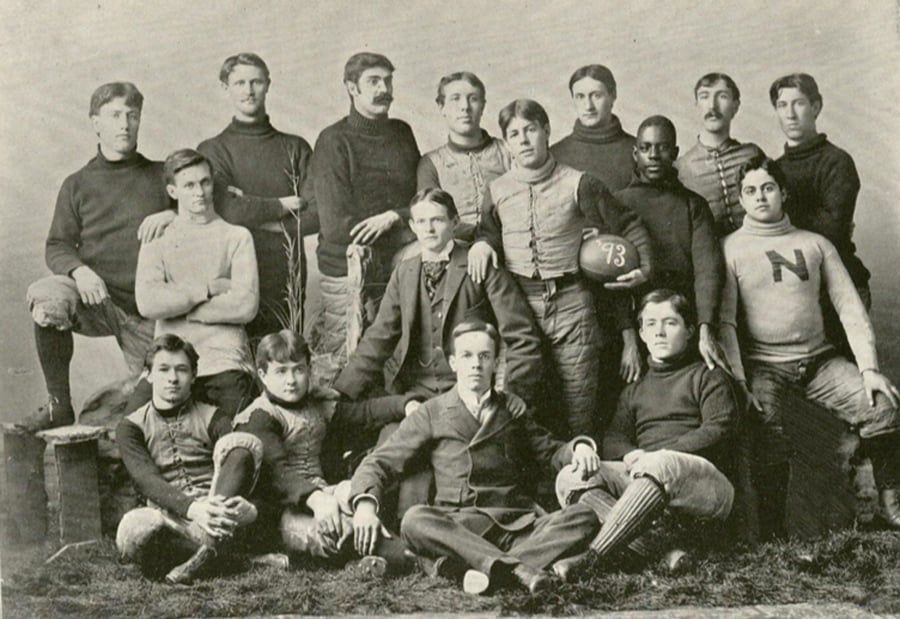Warren’s World: The greatness of George Jewett, Northwestern’s first black football player
The 1893 Northwestern football team. George Jewett is second from the right in the second row.
February 25, 2020
Sports resonate with us for many reasons. It’s the wins and the losses, the relationships formed, the feeling of shared emotion and, above all, the stories, tales and myths we tell of our own exploits; the acts we’ve watched live or the feats told to us by friends or family.
Few stories in college football are as important — and forgotten — as the story of George Jewett, the first African American football player to play for a Big Ten school. A backfield player first for Michigan and later Northwestern, Jewett was not just a groundbreaker, but a star player, and someone who should be in the College Football Hall of Fame.
The Ann Arbor native played for Michigan in 1890 and 1892. During those two seasons, he was the team’s leading scorer, establishing himself as one of the program’s first great players. In a game against a John Heisman-coached Oberlin team, Jewett had a legendary performance as he scored all four touchdowns for the Wolverines.
“Without the benefit of blockers to clear a path for him, he could dodge, wriggle, twist, pivot, and whirl through the opposing team, as well as the modern number-one, All-American back could do with the help of a mighty bulk of human flesh to block for him,” Ralph Stone, a teammate at Michigan, wrote in 1954.
But, Jewett left the school after the 1892-93 academic year due to a conflict with the Medical School dean. So he transferred to Northwestern, where he worked toward his medical degree and played on the football team. When he suited up for his first game, he became the first black player for the Purple.
During Jewett’s two seasons, the NU program was a mess — one headline in the Chicago Tribune during this time read “Northwestern football in gloom: No Team, Enthusiasm, Money, Captain, Coach, or Manager.” And while the program dealt with off-field issues, Jewett was one of — if not the — best player on the field.
According to my calculations, Jewett — who started at right halfback for the Purple — was NU’s top scorer for his two seasons in Evanston, notching seven touchdowns and kicking six PATs in 1893 and achieving half of the team’s touchdowns against non-high school teams in 1894. Jewett, fullback Paul Noyes and left tackle Jesse Van Doozer were named the strongest trio in the West by the Tribune during the 1893 season.
In one game against Lake Forest in 1893, Jewett had four touchdowns — including a 70-yard scamper — and did a great job on defense as well. “His playing form from start to finish was of the phenomenal order,” the Tribune wrote, “and Lake Forest seemed completely dazed by his exertions.” It was such a great game that the following Monday, some sorority members handed him “a handsome bouquet of chrysanthemums.”
On offense, he was a powerful and speedy runner. In addition to his 70-yard score, he also dashed for a 75-yard touchdown against Beloit in 1894 and a 50-yard touchdown against Lake Forest later that year. On defense, he excelled at recovering fumbles. Plus, he served as the punter while also kicking some of the team’s PATs. Reading the old gamers from the Tribune, Jewett was mentioned all the time. He did it all, and he did it all well.
But Jewett’s experience was not all positive. After the 1893 game with Illinois, the Northwestern — a precursor to The Daily — wrote that, “The language which some of the Illinois players used in referring to Mr. Jewett was an index of their breeding.” There are similar narratives of such racism from his time as a player at Michigan. And even though there aren’t many recorded stories of him facing such issues, it would be naive to think he didn’t face discrimination every time he stepped on a field.
Still, Jewett’s story is not well known — and why is tough to explain. He did die young at the age of 38, and he did split his career at two different schools. Playing in the 19th century doesn’t help either. The legends of earlier eras are forgotten more easily, and across all sports, the pioneers of those times usually get pushed to the side. Everyone knows Jackie Robinson, but few know Moses Fleetwood Walker, the first black man to play Major League Baseball in 1884.
This upcoming fall marks 130 years since Jewett played his first collegiate game. It’s time to finally recognize him and his accomplishments properly. The College Football Hall of Fame has over 1,000 inductees. It’s hard to believe Jewett doesn’t deserve to be a part of that exclusive club.
There are so many stories of black athletes that have been lost to history. It’s heartbreaking. Historians, writers and advocates, like the late Buck O’Neil, have done wonders by bringing to light the incredible stories of black athletes. It’s because of people like them we know more about some of the best athletes in history, that they haven’t been forgotten.
George Jewett can’t and shouldn’t be forgotten.
Peter Warren is a Medill junior. He can be contacted at [email protected]. If you would like to respond publicly to this column, send a Letter to the Editor to [email protected]. The views expressed in this piece do not necessarily reflect the views of all staff members of The Daily Northwestern.


